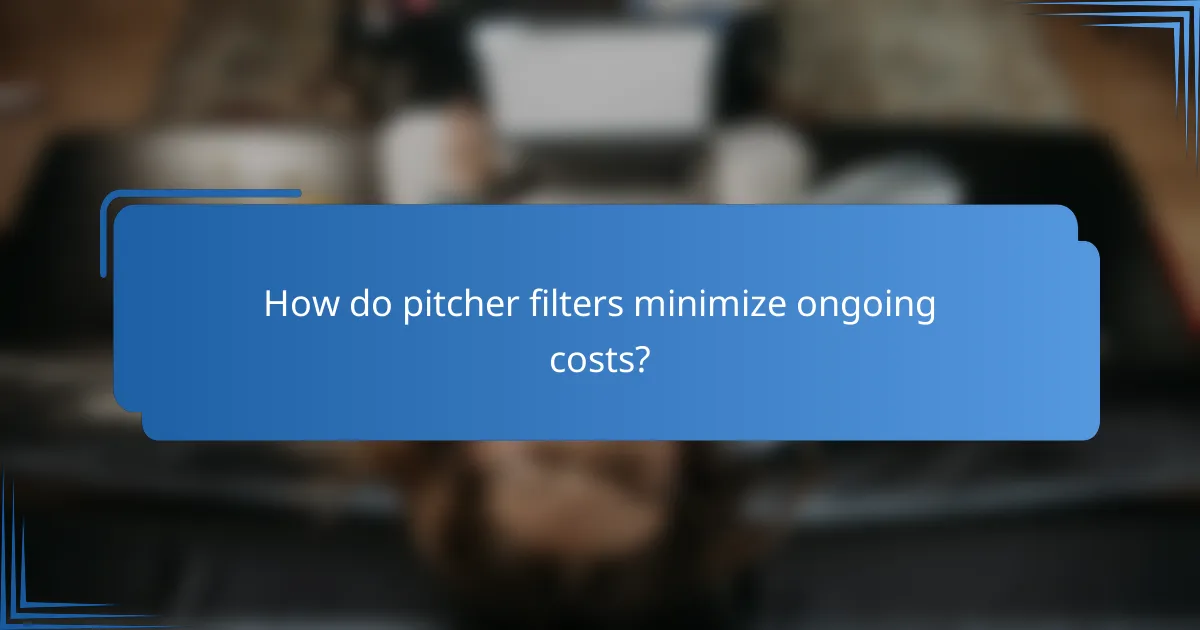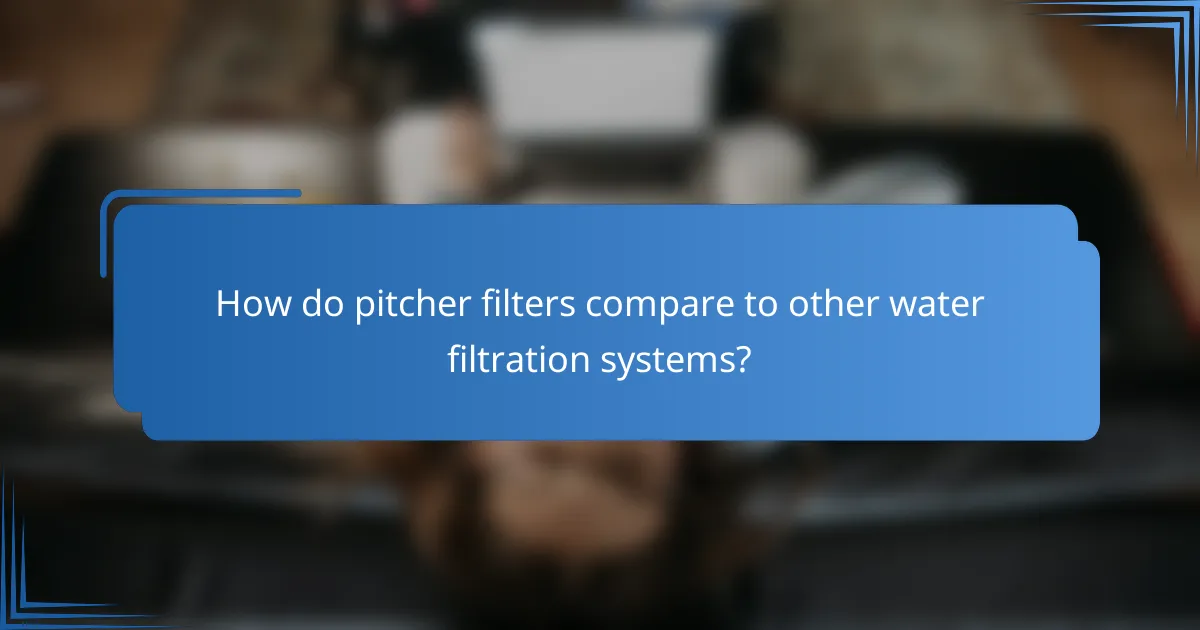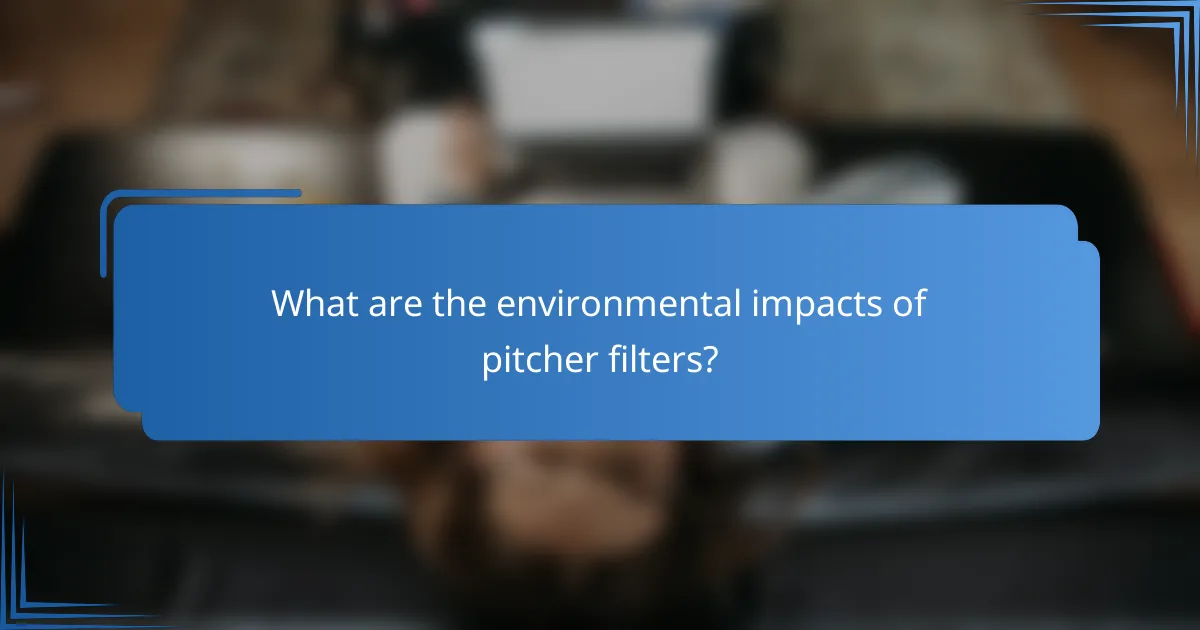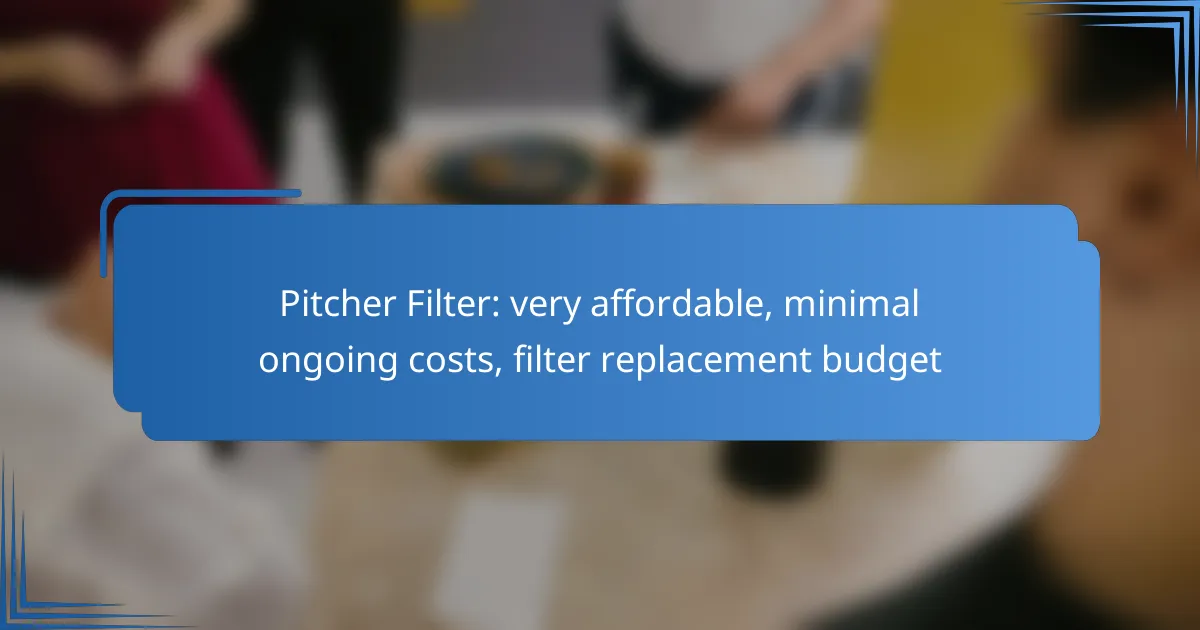When seeking an affordable pitcher filter, it’s essential to consider both the initial purchase price and the ongoing costs of replacement filters. The best options provide effective water filtration while keeping annual replacement expenses low, typically ranging from low to mid double digits. This balance allows users to enjoy clean drinking water without straining their budget over time.

What are the best pitcher filters for affordability?
The best pitcher filters for affordability combine low initial costs with minimal ongoing expenses for replacement filters. These options provide effective water filtration without straining your budget.
Brita Standard Pitcher Filter
The Brita Standard Pitcher Filter is a popular choice for cost-conscious consumers. Priced in the low single-digit USD range per filter, it effectively reduces chlorine taste and odor, as well as other contaminants.
Replacement filters are typically needed every two months, depending on usage. This means you can expect to spend around $20 to $30 annually on replacements, making it a budget-friendly option for many households.
ZeroWater Pitcher Filter
The ZeroWater Pitcher Filter offers a more advanced filtration system, removing virtually all dissolved solids from water. While the initial cost of the pitcher may be higher, the filters are priced similarly to Brita, often around $10 to $15 each.
These filters usually need replacement every 20 to 40 gallons, which can lead to higher ongoing costs if you have a larger household. However, for those prioritizing purity, the investment may be worthwhile.
Pur Classic Pitcher Filter
The Pur Classic Pitcher Filter is another affordable option, typically costing about $7 to $10 per filter. It effectively reduces contaminants like lead and mercury, making it a solid choice for families concerned about water quality.
Filters should be replaced every two months or after filtering about 40 gallons. This results in an annual cost of approximately $30, similar to the Brita option, while providing reliable filtration performance.

How do pitcher filters minimize ongoing costs?
Pitcher filters reduce ongoing costs by providing affordable replacement filters and extending the lifespan of each filter. This combination allows users to enjoy clean water without incurring high expenses over time.
Low-cost filter replacements
Replacement filters for pitcher systems are typically priced in the low tens of USD, making them accessible for most households. Many brands offer multi-pack options that can further reduce the cost per filter, allowing users to stock up while saving money.
When selecting a pitcher filter, consider the frequency of filter changes recommended by the manufacturer. Most filters need replacement every two to three months, depending on usage, which keeps ongoing costs manageable.
Long-lasting filter lifespan
Pitcher filters generally have a lifespan of around 40 to 100 gallons of water, translating to several weeks to a few months of use. This longevity means that users can enjoy filtered water for an extended period before needing to replace the filter.
To maximize the lifespan of your pitcher filter, avoid exposing it to extreme temperatures and follow the manufacturer’s guidelines for cleaning and maintenance. Proper care can help ensure that the filter remains effective for as long as possible, further minimizing costs.

What is the budget for filter replacements?
The budget for filter replacements in pitcher filters typically ranges from low to mid double digits annually, depending on the brand and filter type. Understanding these costs is essential for maintaining clean drinking water without overspending.
Average cost per filter
The average cost per filter for pitcher systems generally falls between $5 and $15. Some premium filters may exceed this range, but many affordable options provide good performance at lower prices. When selecting a filter, consider both the initial cost and the expected lifespan to determine overall value.
Annual replacement expenses
Annual replacement expenses for pitcher filters can vary based on usage and filter lifespan. Most filters need replacement every 2 to 3 months, leading to an estimated annual cost of $30 to $60 for regular use. To manage these expenses effectively, track your filter usage and set reminders for replacements.

Which pitcher filters are compatible with major brands?
Many pitcher filters are designed to be compatible with major brands, ensuring you can find a suitable replacement without hassle. Key brands like Brita and Pur offer filters that fit their respective pitchers, making it easy to maintain clean drinking water.
Brita filter compatibility
Brita filters are specifically designed for use with Brita pitchers and dispensers. The standard filters, such as the Brita Standard and Brita Longlast, effectively reduce contaminants like chlorine and lead, providing better-tasting water.
When replacing a Brita filter, ensure you choose the correct model for your pitcher type. For example, the Brita Longlast filter lasts up to six months, while the Standard filter typically needs replacement every two months, depending on usage.
Pur filter compatibility
Pur filters are compatible with Pur pitchers and dispensers, offering options like the Pur Classic and Pur Ultimate filters. These filters are designed to reduce various impurities, including mercury and certain pesticides, enhancing water quality.
When selecting a Pur filter, check the model number of your pitcher to ensure compatibility. Pur filters generally need to be replaced every two to three months, depending on your water usage and the specific filter type.

What are the features of top-rated pitcher filters?
Top-rated pitcher filters typically offer effective filtration technology, a user-friendly design, and affordable replacement costs. These features ensure clean drinking water while keeping ongoing expenses minimal.
Filtration technology
Filtration technology in pitcher filters usually includes activated carbon and ion exchange resins. Activated carbon helps remove chlorine, sediment, and some heavy metals, while ion exchange resins can reduce hardness and certain contaminants. Look for filters that meet NSF/ANSI standards for specific contaminant reduction to ensure effectiveness.
Some models may also incorporate additional layers or specialized media for enhanced filtration. For example, filters that target lead or PFAS may use advanced materials to provide extra protection. Always check the filter’s specifications to understand what contaminants it can effectively reduce.
Capacity and design
Most pitcher filters have a capacity ranging from about 1 to 3 liters, making them suitable for personal or small family use. The design often includes a spout for easy pouring and a lid that allows for simple filling without removing the entire cover. Consider your household’s daily water consumption when choosing a pitcher size.
Additionally, the design should facilitate easy filter replacement, typically every two to three months, depending on usage. Look for pitchers with clear indicators for filter life, as this can help you maintain optimal performance and water quality without overspending on replacements.

How do pitcher filters compare to other water filtration systems?
Pitcher filters are generally more affordable than other water filtration systems, making them an attractive option for budget-conscious consumers. They have minimal ongoing costs, primarily associated with filter replacements, which are typically straightforward and inexpensive.
Cost comparison with faucet filters
When comparing pitcher filters to faucet filters, pitcher filters usually have a lower initial purchase price. A basic pitcher filter can cost around $20 to $40, while faucet-mounted filters often range from $30 to $70. However, consider the ongoing costs; pitcher filters require regular filter replacements, usually every two to three months, costing about $10 to $20 each time.
Faucet filters may have a longer lifespan for their cartridges, often lasting six months or more, which can make them more economical in the long run. Ultimately, the choice may depend on your water consumption and how often you prefer to change filters.
Efficiency comparison with under-sink systems
Under-sink filtration systems typically offer higher filtration efficiency and capacity compared to pitcher filters. These systems can remove a wider range of contaminants and provide a continuous supply of filtered water, which is beneficial for larger households.
However, under-sink systems come with a higher upfront cost, often ranging from $150 to $500, and may require professional installation. In contrast, pitcher filters are easy to use and require no installation, making them a practical choice for renters or those seeking a simple solution.

What are the environmental impacts of pitcher filters?
Pitcher filters have several environmental impacts, primarily related to plastic waste and water usage. While they reduce contaminants in drinking water, the filters themselves contribute to landfill waste when disposed of, and the production process has its own carbon footprint.
Plastic Waste from Filters
The most significant environmental concern with pitcher filters is the plastic waste generated from used filters. Each filter typically lasts for a few months before needing replacement, leading to multiple filters being discarded annually. This accumulation can contribute to the growing problem of plastic pollution.
To mitigate this impact, consider brands that offer recycling programs for their filters. Some manufacturers allow you to send back used filters for proper recycling, which can help reduce landfill contributions.
Water Usage Considerations
While pitcher filters can improve water quality, they also require water to operate effectively. The filtration process can lead to some water waste, especially if the filter is not maintained properly. Regularly replacing filters as recommended ensures optimal performance and minimizes unnecessary water usage.
Be mindful of the water quality in your area; if your tap water is already treated and safe, the need for filtration may be less critical, potentially reducing unnecessary consumption of resources.
Carbon Footprint of Production
The production of pitcher filters involves energy and raw materials, contributing to their overall carbon footprint. This includes the extraction of materials, manufacturing processes, and transportation. While the impact is lower compared to bottled water, it is still a factor to consider.
Choosing filters made from recycled materials or those that prioritize sustainable manufacturing practices can help lessen this environmental impact. Look for certifications or labels that indicate eco-friendly production methods.
